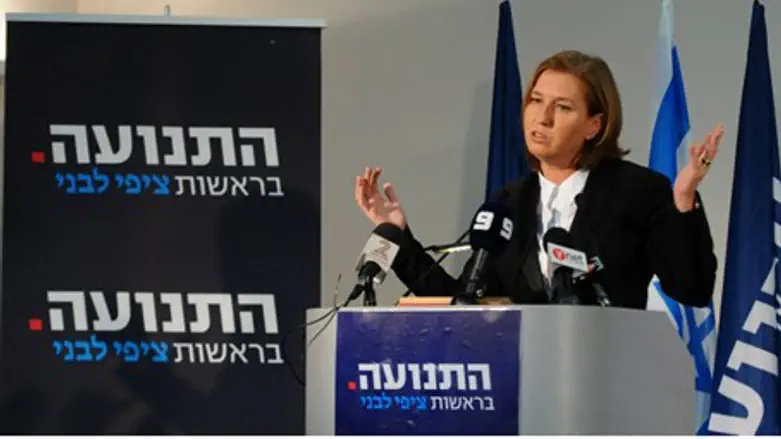
Prime Minister Binyamin Netanyahu has been holding direct talks with Hatnua chairwoman Tzipi Livni over the possibility of her party joining the coalition, a Channel 2 News report said on Monday.
According to the report, Netanyahu’s number two, Yisrael Beytenu head Avigdor Lieberman, has also been speaking with Livni in recent days, in an attempt to convince her to join the coalition.
A negotiating team from Hatnua met on Monday with the Likud Beytenu’s negotiating team, as the efforts to build a coalition entered their second day.
Livni, whose newly formed party achieved just six seats in the election, has conditioned her entering the coalition on the resumption of peace negotiations with the Palestinian Authority.
Netanyahu, noted the Channel 2 report, has repeatedly mentioned his intention to restart negotiations in recent days. In his speech on Saturday night after being tasked by President Shimon Peres with forming the next government, Netanyahu indicated that one of his objectives would be to start a diplomatic process with the PA.
On Sunday, Netanyahu told the new U.S. Secretary of State, John Kerry, that he would strive to launch “a sober and responsible diplomatic process.” Also on Sunday, Attorney Yitzchak Molcho, who was Netanyahu’s private emissary for talks with the PA in the last government, announced he would not take part in coalition negotiations so that he could continue as peace envoy.
These steps may have been a wink in Livni’s direction, Channel 2 speculated, in an attempt to woo her into the coalition. The reason may be Netanyahu’s growing concern that Yair Lapid’s Yesh Atid will ultimately choose to join the opposition if a compromise is not reached over Lapid’s radical program for compulsory military enlistment of hareidi men.
The Maariv daily reported on Monday that Lapid and Bayit Yehudi (Jewish Home) chairman Naftali Bennett have forged a common front in the coalition talks, which will make it impossible for Netanyahu to form a coalition without both of them.
The Lapid-Bennett front may also be a reason for Netanyahu’s trying to convince Livni to join the coalition. In addition, Lapid was quoted on Sunday as saying the following in a "closed conversation" held in the course of the last few days:
"I am not sure that I will be in the coalition. I could be the chairman of the opposition. Netanyahu will carry out financial reforms that will hurt the middle class and in 18 months I will replace him. That is what many of my advisers think will happen as well."
Livni, who headed Kadima in the 2009 election, subsequently refused to join Netanyahu's coalition and apparently came to regret this decision, as it turned out to be a stable one. She does not have much motivation for remaining in the opposition. The Labor party, which has stated emphatically that it will remain in the opposition, is more than twice the size of Livni's party, and would likely overshadow it.
If Lapid stays out of the coalition, Netanyahu would likely be left with a narrow majority consisting of Shas, United Torah Judaism, Kadima and Bayit Yehudi (if the reports of the Bennett-Lapid agreement end up being a spin as was speculated on Monday). This would likely make it difficult for his government to survive for long, thus giving him more of an incentive to have Livni join.
Yoel Hasson, a member of Hatnua who was placed in the seventh spot on its list and thus did not make it into the Knesset, said on Monday that his party requested during coalition talks with the Likud that Livni would lead any peace negotiations if it joins the coalition.
“We want Tzipi Livni to lead the negotiations in cooperation with the Prime Minister, with the final decision being made by the Prime Minister,” Hasson told Army Radio, adding that his party “will not sit in a government that does not advance negotiations.”
In an attempt to cover his bases and find an alternative to Lapid, Netanyahu will also meet on Tuesday with Labor chairwoman Shelly Yechimovich.
Yechimovich, however, indicated on Monday evening that although she agreed to meet Netanyahu, her party still does not plan on joining his coalition.
